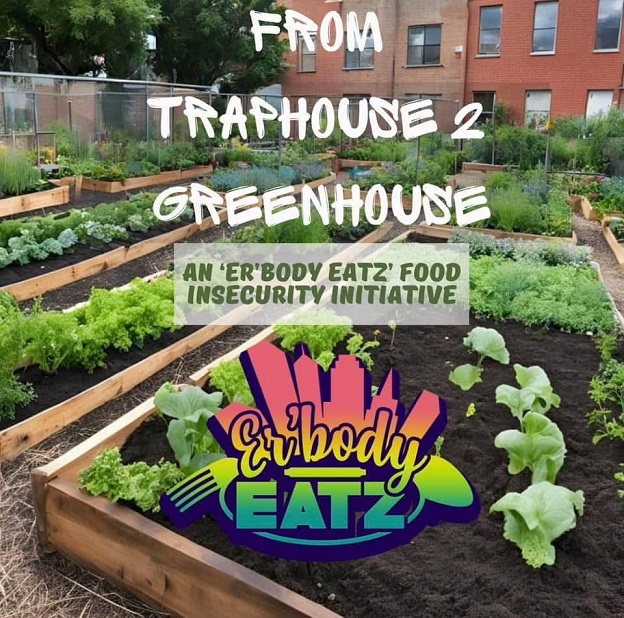
Longtime Chef J’Kwan Fulmore wants to show Fayetteville that positive outcomes can have a snowball effect by turning blighted properties into productive spaces that foster food security, environmental sustainability and community pride.
The Fayetteville native founded Er’Body Eatz – a nonprofit that focuses on raising awareness on food insecurity in lower income communities by teaching urban gardening and farming, as well as sustainability – in 2024. Now, he wants to keep expanding and proving that showing signs of care, investment and positive change in a community can foster pride, respect and further improvements.
To do that, Fulmore is hoping to bring community education regarding urban farming through a new initiative: “From Traphouse to Greenhouse.”
Dubbed his ‘magnum opus,’ this new initiative will utilize areas with foreclosed properties, installing vertical gardening plots and using hydroponic setups to grow crops, addressing food insecurity and revitalizing neglected urban neighborhoods.
Fulmer shared that a vertical garden typically consists of growing plants upward on walls, or specially designed structures instead of traditional horizontal beds. Plants are grown in containers, pockets or modular panels attached to vertical surfaces, and they can go outside a home on walls and fences, or inside the home with proper lighting.
Initiative plans also include installing hydroponic gardens, a method of growing plants using a nutrient-rich water solution to make up for the absence of soil. This method requires that plants are placed on a growing medium like a coconut coir or clay pellets. Roots are then submerged in or misted with nutrient-rich water that delivers essential nutrients to the plants.
Leafy greens like lettuce, spinach and arugula are good examples of produce that can be grown through hydroponics methods. Other examples include basil, parsley, dill, peppers, tomatoes and cucumbers.
“It’s very replicable and repeat able and doable, turning foreclosed and abandoned properties into green spaces within neighborhoods. These are homes that nobody cares to renovate or fix up because it’s not worth their time, energy and resources,” Fulmore said.
Cleaning up those areas and setting up gardens will have a transformative effect on residents’ outlook and pride in their neighborhood.
Fulmore calls this the “reverse broken window theory.” He said he wants to dispel notions that suggest seeing bad outcomes in a community lead to equally bad outcomes and flip them on their head.
“The biggest mission that I have right now is to change the narrative that access to affordable and nutritious foods is unobtainable by everyone, because it absolutely is. The people that we are hoping to reach and the areas that we're hoping to improve are in more of those urban areas. Fayetteville is rapidly developing, and it’s kind of outgrowing the people that have been here for generations, and some of those people are watching their city turn into something that they have no ability to be a part of in a sense,” Fulmore said. “When it comes to access to fresh and nutrient-dense meals, they get overlooked.”
The produce Er’Body Eatz grows varies from season to season. The organization’s endeavor is also powered by community members donating their time.
“We have a lot of insight from people within the city already who are experts in gardening, farming and agriculture. It’s not something that we do alone,” he said. “Everybody is a resource for the community to be able to interact with, like our local farmers, butchers. They are resources that people may not get to see on the day to day.”
Immediate goals for the project include securing a single foreclosed property from the city to demonstrate the program’s potential, giving the ability for a community buy in, building trust and excitement among residents by hosting events and showing visible progress and producing a scalable model, using the pilot project as a blueprint to expand the initiative across other neighborhoods.
Fulmer shared that within the next five years, the goal is to provide access to foods to disadvantaged neighborhoods and build food pantries.
“I grew up around those areas,” he said. “I left Fayetteville for almost 10 years and I came back, and a lot of those areas are stuck in time. Nothing changes, and the city just keeps getting better. But these places are not, these neighborhoods are unmoved. This is my way to give back. I don’t mind doing the groundwork and being the person that does take the initiative to do something about it.”
Learn more about the initiative and keep up with Er'Body Eatz by following them on Facebook at www.facebook.com/ErBodyEatz.

Kristen Botts co-founded the program with her husband, Nathan Botts, who is a Veteran himself. Photos provided by Kristen Botts.An organization helping Veterans live a full life after their service in the U.S. Military wants to connect Veterans and d

Patrick NoblesHuntington Bancshares Incorporated announced on Feb. 2 that it has closed its merger with Cadence Bank, a regional bank headquartered in Houston, Texas and Tupelo, Miss. This strategic partnership accelerates Huntington’s growth in

There is extensive dialogue surrounding Fayetteville as a travel destination or city aimed at recruiting new businesses and new residents. As someone who moved here from out of state, I thought it could be fun to share my personal experience as